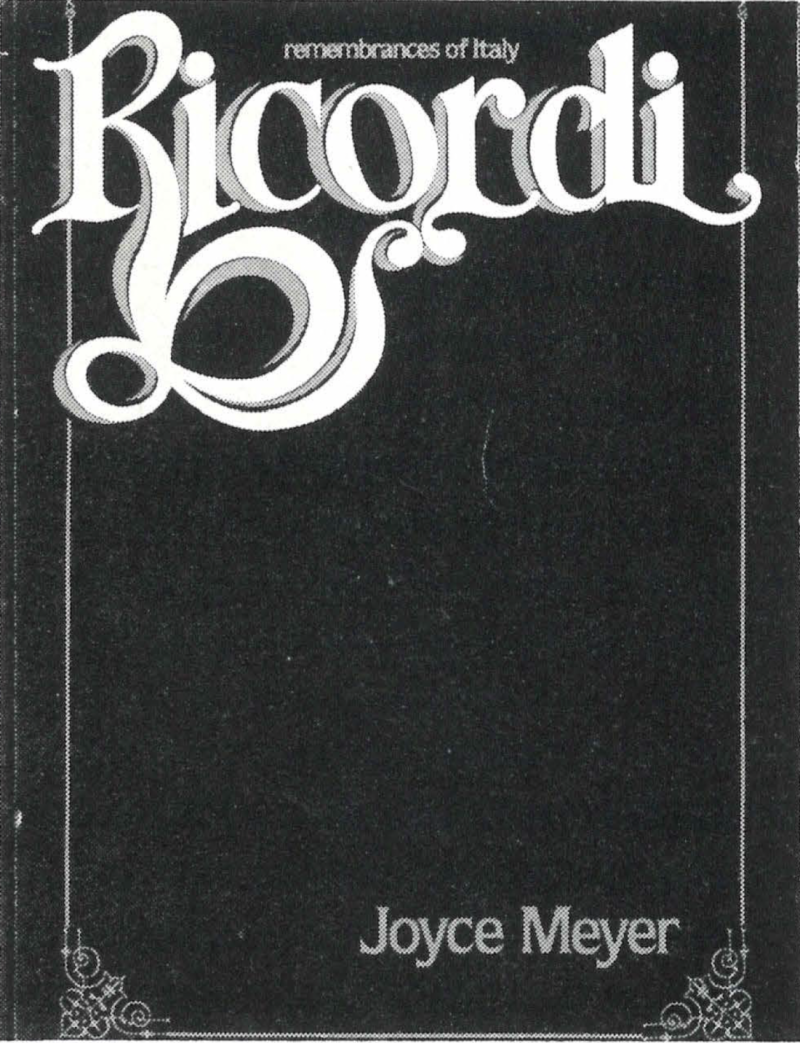“Ricordi: Remembrance of Italy” by Joyce Meyer
If you have ever experienced a hunger and a thirst for life, by that I don’t mean appetite for profit or success, but a real hunger to understand, you may find awaiting you a gift—an amatorio—in Joyce Meyer’s Ricordi. It is a wonderfully pleasant and rewarding encounter, a book you can possess with mind and spirit and feel enriched.

The author is a Canadian journalist and Ricordi (Italian for memories or memoir) is a novel written as a memoir by a Canadian woman journalist who has lived in Italy some eleven years. The memoir begins when she is back home in Canada, secure amid the familiar attitudes, values and mores of her own culture.
But the view from her office window—a hamburger stand, a morgue, other expressions of Canadian culture—seem mean-spirited, feeble in contrast with the memories of Italy. The memories are graphic and physical. In Rome, “even the floodlit statues had a particular look of crookery about them, a deep and old cynicism, a cunning wisdom.” A jumble of medieval stone houses, unplanned as they are, suggests some creative genius at work. A bottomless volcanic lake binds her forever to Italy.
Taken back in time we meet a Canadian bred, timid-bold woman, who steps hesitatingly into life itself. The Romans are vivacious, beautiful, arrogant, noisy, often rude and inconsiderate. They act instead of merely reacting. They reach out, grasp life, live with awe, reverence, zest. Acting on the deepest of human impulses is natural. The sensual impressions, paintings, furnishings, the food—I could almost taste the cheeses, breads, salamis, fruits, pastas, vegetables, pastries and wines—the music and the faces of the people are so visceral the reader is able to share the experience of sound, texture, taste and colour.
The story vibrates with the tumult of the city, the throngs of human beings. The author can conjure up specific moments and places as well as legends and individuals. Her life in Canada, by contrast, appears aimless, enfeebled, penetrated with a fear of life. What was its goal? Its purpose? She might have been sleepwalking. To try to understand the hidden meaning of all that joy and vitality can be frightening. It can be dangerous to give the soul’s hunger more than a milk-and-water kind of life. The arrogance of Latin men is steeped in centuries of machismo which does not encourage a Canadian woman to become a ‘heroine’ or even an individual. Still, she feels a strong sense of communion with these people. Their history becomes her history. There is, after all, only one glory and that is in being alive.
It is not all mad excitement or soft cadences by any means. There is the menefreghismo—the couldn’t care less attitude of the Italians; there is exasperation, frustration, anger, even disgust. There are times she wants to get away from that mad, inefficient crooked country before she goes mad. There is deception, heat, chaos—but scenes and reveries bind her to the country.
I found myself anxious, in the way one reads a thriller, for the woman in the story to jump free of the clockwork, to leap into life’s current and swim like a porpoise. I don’t want to spoil the story by revealing whether she does or does not, but it is plain that to find your own strength you have to come to grips with every kind of experience. Her consciousness is heightened. She learns how to love human beings, nature. There are love affairs, not ‘romances’. There is a sense that vitality and the soul’s hunger are an attempt to grasp essential truths, the fundamental experience of being alive. She learns how to survive and more about how to live.
A friend and mentor, driving her through the Tuscany landscape, says goodbye as she is leaving for Canada.
“Sei strat veramente brave,” he says. It is the ultimate compliment. She has been clever, intelligent.
The value of the novel for me was not just in the Roman candle hissing and flashing kind of flamboyance Joyce Meyer describes so well, nor yet in the battering, the exhaustion, the bird testing its wings, the surge of terror, though all these things are splendid. It was in what this novel touches upon; the hunger of the soul, the courageous attempt to grasp at hidden meanings that is the common experience of all of us. I am not surprised Ricordi was awarded the Literature Prize in a Canada-wide contest sponsored by the Italian government and the City of Ottawa. To read it is to have your own psyche, if not transformed, at least touched and enriched. ■
Ann Henry, a Winnipeg writer and playwright, is the author of Lulu Street and It’s All Free on the Outside.

